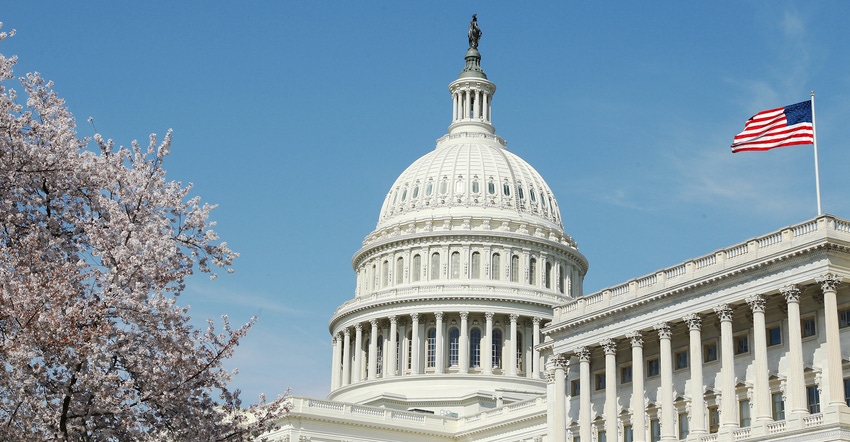
Following the House Agriculture Committee action on marking up its farm bill, soon it will be the Senate's turn to see what changes might be ahead for farmers. Although the Senate has not produced its farm bill draft, it is expected to do so in the next few weeks. Beyond the overwhelming differences likely on the nutrition title, some of the changes House Agriculture Committee Chairman Mike Conaway, R-Texas, made may not find their way into the Senate bill.
Senate Agriculture Committee ranking member Debbie Stabenow, D-Mich.. has been a longtime supporter of conservation and touted the increases in the last farm bill. While individual conservation programs receive sufficient funding in the House version, the Congressional Budget Office’s score shows funding levels heading downward, with estimates that the bill would cut $75 million in conservation funding over the next five years and $800 million in funding over the next decade.
The largest working lands program -- the Conservation Stewardship Program -- would be rolled into the Environmental Quality Incentives Program. Furthermore, funding for working lands conservation would be cut by $5 billion over the next 10 years.
“Farm bill conservation programs provide farmers with certainty in a down farm economy. In the face of low commodity prices, looming trade restrictions and a global population approaching 10 billion, substantial and sustained conservation funding is critical for building an economically and environmentally resilient food supply,” said Callie Eideberg, Environmental Defense Fund senior policy manager, sustainable agriculture.
Payment limits
During the 2014 Farm Bill debates, both the House and Senate chose to adopt historic reforms and close payment limit loopholes. During final conference negotiations only minor adjustments ended up being made. Conaway's proposal exempts most corporate farms from being limited to a single payment limitation. Under current law, payment limits apply to payments received directly or indirectly by individuals and corporations. The Conaway bill would exempt LLCs and Subchapter S corporations, meaning 10% or more of the nation’s commodity farms would eligible for unlimited subsidy payments overnight, and that number would surely grow as more farms reorganize to take advantage of the change.
His bill also entirely removes payment limitations from marketing loan gains and loan deficiency payments. Under current law, all forms of commodity program benefits are subject to the payment limitation. Under the Conaway provision, there would be no limit at all on marketing loan gains or loan deficiency payments.
Energy title
The House legislation also drops the traditional Energy Title and folds its programs under the Rural Development Title. “Furthermore, the bill would strip programs of mandatory funding they may have received in previous years, making their chances of survival daunting in a budget-hawkish environment,” according to a statement from Solutions for the Land, a coalition of agricultural, forestry and conservation stakeholders.
The Energy Title has been included in the farm bill since 2002. Those programs at risk include the high-profile, widely used Rural Energy for America Program, which carries no funding in the actual bill, although it is marked in a bill summary for $45 million in discretionary funding.
Solutions for the Land noted that other programs seen as making critical contributions to the agriculture industry's economic health are left with small, annual discretionary amounts, including the Biomass Crop Assistance Program ($25 million), which supports U.S. cellulosic biofuel production, and the Biorefinery, Renewable Chemical & Biobased Product Manufacturing Assistance ($75 million).
Commerce clause
Rep. Steve King (R., Iowa) received voice vote approval in the House Agriculture Committee for an amendment that includes his Protect Interstate Commerce Act (PICA). King said PICA is designed to end unconstitutional efforts by some states to regulate the means of production of agricultural goods in other states. The provision was included in the House version in 2014, but was not found in the Senate.
He offered, as one example, California's attempt to prevent the in-state sale of eggs produced in any state that does not adhere to California’s burdensome regulations governing cage sizes. “Such restrictions are an unconstitutional infringement on Congress’s constitutional authority to regulate interstate commerce,” King said. He added that his legislation is necessary “because, without the protections PICA provides, producers from states that do not comply with the shifting regulatory whims of a state like California would lose access to important markets.”
Joe Maxwell, executive director for the Organization for Competitive Markets, opposed King's amendment, saying, “We are deeply disappointed that a majority of the House Agriculture Committee members joined Rep. King in an attack on our states’ rights, siding with corporate agribusiness over local control of farming and food. Over 100 farm and food groups have voiced opposition to this overreaching legislation, and we will continue to fight to protect the rights of family farmers and rural communities as the farm bill moves forward.”
Animal disease funding
The House agriculture panel’s farm bill calls for first-year mandatory funding of $150 million for a foot and mouth disease (FMD) vaccine bank, $70 million in block grants to the states for disease prevention and $30 million for the National Animal Health Laboratory Network (NAHLN), which provides disease diagnostic support. For the other years of the five-year farm bill, i calls for $30 million in mandatory funding for state block grants and $20 million to be used at the agriculture secretary’s discretion for the vaccine bank, NAHLN and the states.
The National Pork Producers Council and National Cattlemen’s Beef Assn. are urging lawmakers to provide funding of $150 million for the vaccine bank, $70 million for state block grants and $30 million for NAHLN for each year of the farm bill.
Get ready! It's going to be a fun ride ahead.
About the Author(s)
You May Also Like






